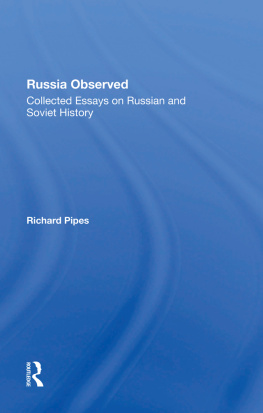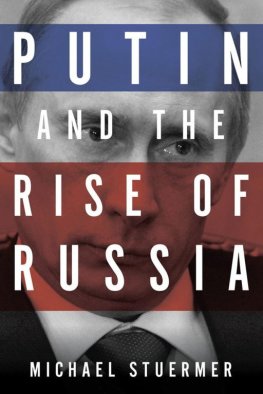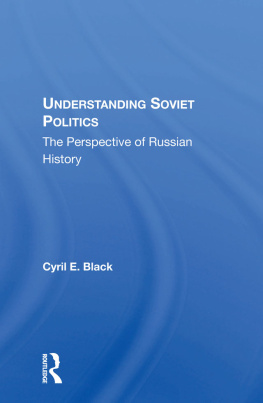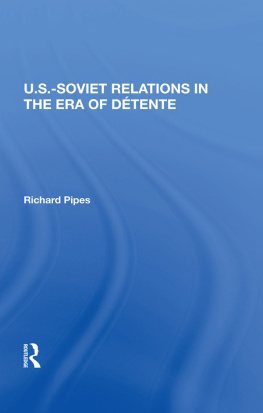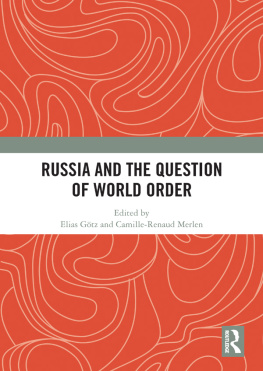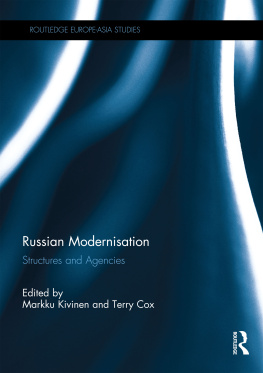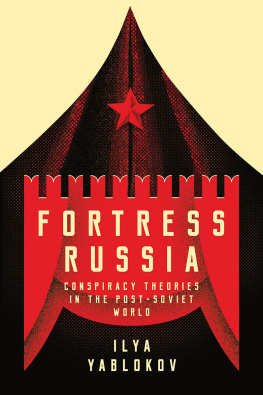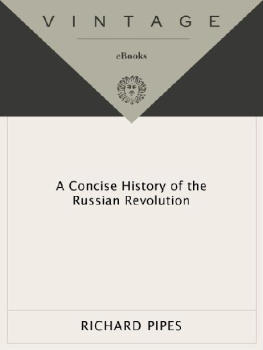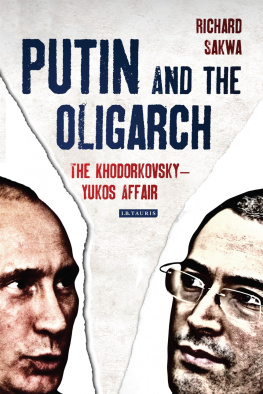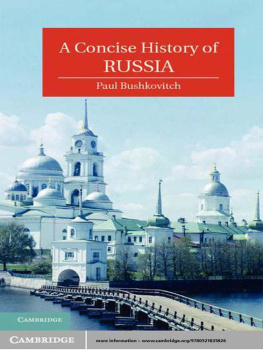First published 1989 by Westview Press
Published 2019 by Routledge
52 Vanderbilt Avenue, New York, NY 10017
2 Park Square, Milton Park, Abingdon, Oxon OX14 4RN
Routledge is an imprint of the Taylor & Francis Group, an informa business
Copyright 1989 by Taylor & Francis
All rights reserved. No part of this book may be reprinted or reproduced or utilised in any form or by any electronic, mechanical, or other means, now known or hereafter invented, including photocopying and recording, or in any information storage or retrieval system, without permission in writing from the publishers.
Notice:
Product or corporate names may be trademarks or registered trademarks, and are used only for identification and explanation without intent to infringe.
Library of Congress Cataloging in Publication Data
Pipes, Richard.
Russia observed: collected essays on Russian and Soviet history /
Richard Pipes.
p. cm.
Includes index.
ISBN 0-8133-0788-0
1. Soviet UnionPolitics and government. 2. MinoritiesSoviet
UnionHistory. I. Title.
DK61.P57 1989
947dc19 88-29026
CIP
ISBN 13: 978-0-367-28648-4 (hbk)
The essays in this book span nearly four centuries of Russian history. Their topics differ, but they are linked by a common theme, which is Russian political thought and practice.
I was born in Polish Silesia, in the shadow of World War I. Although Warsaw, the city in which I was raised, had been part of the Russian Empire for a centuryfrom the Congress of Vienna until the German occupation of 1915in my personal life Russia played hardly any part. My father was a native of Austro-Hungarian Galicia and spent his youth in Vienna. During the war, he fought in the ranks of Pilsudski's Legions on the Austrian side. My first language was German: It was only at six, when I was enrolled in school, that I learned Polish. The main source of my cultural influence until the age of seventeen was Germany: as an adolescent I read Nietzsche, Schopenhauer, and Rilke; I pored over Meyer's Konversationslexikon; and I preferred German music to any other. Soviet Russia in the 1930s was hermetically sealed. Although geographically next door, it could as well have been on another planet: all that reached us from there were muted echoes of some terrible and incomprehensible tragedy. Apart from reading some Russian short stories and listening to Russian music, I do not recall having had any contact with the culture or politics of Russia up to the time when World War II broke out and I had to flee Poland with my parents, first to Italy and then the United States.
My interest in Russia was awakened by the Nazi-Soviet wara war in which the fate of civilization was at stake and, one felt instinctively, even our very lives. I followed the progress of the campaigns and traced on maps the shifting lines of the Eastern front. In 1942, while a college junior, I realized with great excitement that with my knowledge of Polish I could easily acquire Russian. I bought a Russian grammar and dictionary, and began to teach myself. In 1943 I entered the army, which sent me to Cornell for a nine-month course of Russian. The faculty were no ordinary language teachers but emigre intellectuals, several of them Mensheviks and Socialists-Revolutionaries. The students, like myself in uniform, were mostly New York liberals with pro-Soviet sympathies which I did not share: for although I ardently desired Soviet victory, I found their illusions about Stalinist Russia childish.
The war over, I enrolled at Harvard for a degree in history. My mam interests were European cultural history, philosophy of history, and the history of Western art. I intended Russia to be only one of four fields required for the Ph.D. General Examination. Accordingly, the department initially assigned to me as faculty advisor Crane Brinton, a distinguished specialist in the history of European thought. It transpired, however, that the departmental requirements for a doctorate were more rigid than I had realized and that my broad program of studies in European Geistesgeschichte was not feasible. On Brinton's advice to settle on a national field, I chose Russia, and was reassigned to Michael Karpovich. While I did take courses in the history of philosophy and the philosophy of history, my graduate work became increasingly focused on Russia. The establishment in 1948 of the Russian Research Center had the further effect of committing me to that field: I became a Fellow of the Center a year later and found myself totally immersed in Russian and Soviet affairs.
When I think back and try to reconstruct the mental processes that led me to devote myself professionally to the study of Russia, I have to conclude that, initially at any rate, it was the overpowering presence and threat of Stalinist Russia which loomed as ominously over our lives after the war as Hitler's had done in the 1930s. For those who did not live through the immediate postwar period and have not experienced these sensations, they are probably difficult to understand. The weakness of "revisionist" histories of U.S.-Soviet relations during this period derives mainly from a failure of the imagination, which results in the "Cold War" being reduced to a conventional great power contest and "values" to mere propaganda tools. They were nothing of the kind to contemporaries to whom the Nazi-Soviet alliance of 1939 and cooperation against the Western democracies were fresh in memory and the postwar Stalinist terror a continuation of defunct Nazism. The Cold War appeared at the time as a test of wills whose outcome would determine whether the rest of the world would have to share the fate of the peoples of Russia under Lenin and Stalin. It was no mean issue.
Those of us who felt this way, naturally were deeply interested in understanding what made Soviet Russia behave as it did. This question could be answered in two ways: sociologically and historically. One could treat the Soviet Union without reference to its historical experience or political culture, as just another society at a certain stage of socioeconomic development ("modernization" was then the fashionable word), best analyzed by comparison with other societies at a similar stage. This approach dominated thinking at the Russian Research Center, which had been founded for the specific purpose of approaching Soviet Russia in an anthropological and sociological (i.e., ahistorical and apolitical) manner. I belonged to a small minority which held that a nation's behavior is shaped mainly by its historical experience and the unique culture that results from it, and that one can no more deduce this behavior from sociological models than understand an individual's behavior from generalizations about "human nature."
My earliest publication dealt with the Russian Military Colonies under Alexander I: it was adapted from a paper I had written in the spring of 1947 for Crane Brinton's seminar. The essay suffers from the faults of youth (I was only twenty-four at the time): it strains the argument and is written in a stiff, academic prose style that I then thought becoming a scholar. In writing it, I was vaguely conscious of an analogy between the colonies of Alexander I and Soviet collectives farms, and although the argument is not really worked out, it still seems to me to have merit.
I began work on my doctoral thesis in the summer of 1948. It was the heyday of Stalinist nationalism and it interested me to find out why and when a regime espousing an internationalist ideology had adopted an extreme form of Great Russian chauvinism. My dissertation, completed in 1950, dealt with the evolution of socialist and Communist thought on the subject of nationality and nationalism and concentrated on Lenin's tactical use of minority nationalism in his quest for power.

